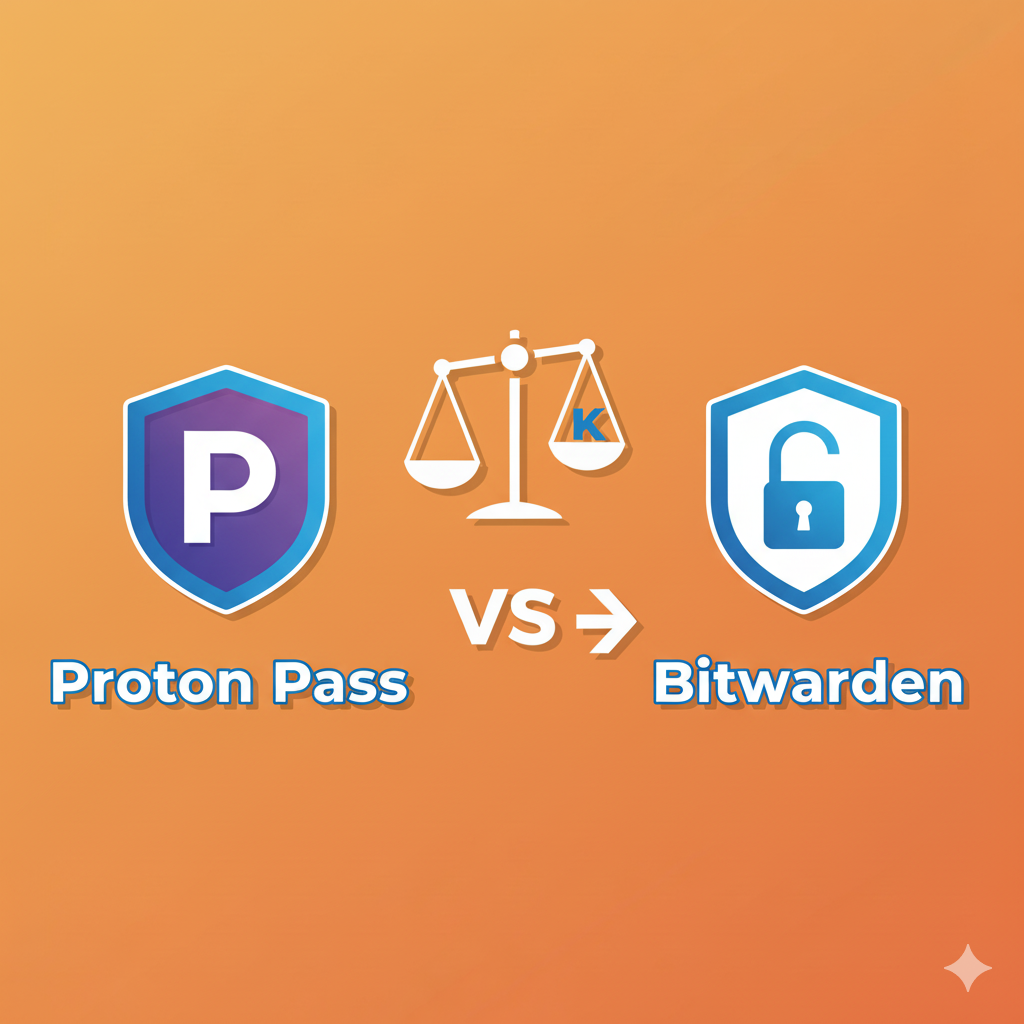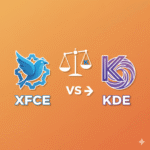In today’s digital world, managing passwords manually is nearly impossible. We all have dozens (if not hundreds) of logins from email and banking apps to streaming platforms and work tools.
That’s where password managers step in they securely store and autofill passwords so you don’t have to remember each one.
Two big names in this space are Bitwarden and Proton Pass.
Both focus on security, privacy, and transparency but they take slightly different approaches.
Let’s start by understanding each one.
What Is Proton Pass?
Proton Pass is a relatively new password manager created by Proton AG, the same Swiss company behind Proton Mail and Proton VPN services known for their strong stance on privacy and data protection.
It’s designed with end-to-end encryption, meaning only you can access your data. Even Proton themselves can’t see your passwords.
Key Features of Proton Pass:
- End-to-end encryption (E2EE) for all data
- Open-source codebase (publicly auditable)
- Password generator
- Secure notes
- 2FA (Two-factor authentication) support
- Email aliasing (hide your real email)
- Browser extensions and mobile apps
- Integration with Proton ecosystem (Mail, VPN, Drive)
What makes Proton Pass unique is its privacy-first mindset.
Everything — from your logins to your email aliases — stays encrypted and protected under Swiss privacy laws.
What Is Bitwarden?
Bitwarden is one of the most popular open-source password managers available today. It’s been around for years and has earned the trust of individuals and businesses alike.
Like Proton Pass, Bitwarden also uses end-to-end encryption, meaning your passwords are encrypted before they ever leave your device.
Key Features of Bitwarden:
- End-to-end encryption for all vault data
- Open-source and audited
- Password generator
- Secure password sharing
- Cross-platform apps (Windows, Mac, Linux, iOS, Android, browsers)
- 2FA and biometric login
- Self-hosting option (for advanced users)
- Secure vault syncing
- Encrypted file attachments
Bitwarden has built a strong reputation for being transparent, reliable, and affordable, making it a favorite among security-conscious users.
Proton Pass vs Bitwarden: Detailed Comparison
Let’s compare them across key aspects that matter most to users — security, privacy, features, usability, pricing, and more.
1. Security
Both Proton Pass and Bitwarden take security extremely seriously.
Proton Pass:
- Uses end-to-end encryption (E2EE) for everything — including metadata (like usernames, URLs, and notes).
- Built on the same security architecture as Proton Mail.
- Passwords and aliases are encrypted using Argon2, a modern, secure hashing algorithm.
- Swiss-based, protected by strong Swiss privacy laws.
Bitwarden:
- Also end-to-end encrypted — only you can decrypt your data.
- Open-source, meaning anyone can audit the code for vulnerabilities.
- Supports advanced encryption standards (AES-256 bit).
- Offers optional self-hosting for complete control over your data.
- Security audits are done regularly by independent firms.
Verdict: Both are secure, but Bitwarden’s long track record and self-hosting option give it a slight edge for advanced users.
Proton Pass wins in privacy jurisdiction (Switzerland) and encrypting even metadata.
2. Privacy
Privacy is where Proton Pass truly stands out.
The company behind it, Proton AG, has built its entire brand around privacy they don’t track, sell, or analyze your data. Plus, their servers are located in Switzerland, outside EU and US surveillance alliances.
Bitwarden, while very privacy-conscious, is based in the United States, which means it falls under US data jurisdiction. However, because everything is encrypted before leaving your device, even Bitwarden itself can’t access your passwords.
Verdict:
If jurisdiction and strict privacy laws matter to you, Proton Pass wins.
If open-source transparency is more important, Bitwarden wins.
3. Ease of Use and Design
Proton Pass:
Proton Pass has a clean, modern interface consistent with Proton Mail and VPN. It’s simple, uncluttered, and intuitive for new users.
The browser extension and mobile app work smoothly, and the integration with Proton Mail makes it easier to create email aliases automatically.
Bitwarden:
Bitwarden’s interface is functional but slightly more traditional. It’s not flashy, but it’s very stable and works seamlessly across every platform.
It might take a few extra clicks to access some features, but once you get used to it, it’s straightforward.
Verdict:
Proton Pass offers a more modern, minimal UI, while Bitwarden focuses on practicality and cross-platform consistency.
4. Password and Alias Management
Proton Pass includes a built-in email alias feature (similar to SimpleLogin) that allows you to generate new email addresses to protect your real one. This is useful for avoiding spam and keeping accounts private.
Bitwarden, on the other hand, doesn’t offer native aliasing. You can integrate it with third-party aliasing services, but it’s not built-in.
Both allow you to:
- Save passwords securely
- Autofill login fields
- Generate strong passwords
- Store secure notes
However, Proton Pass’s alias system adds a privacy bonus.
Verdict: Proton Pass wins for having integrated email aliasing.
5. Cross-Platform Compatibility
Proton Pass:
- Available for Windows, macOS, Linux (browser extensions)
- iOS and Android apps
- Works best when paired with Proton ecosystem
Bitwarden:
- Available on all major platforms Windows, macOS, Linux, Android, iOS, and every browser.
- Also offers a web vault for direct online access.
- Has command-line tools and browser integrations for Firefox, Chrome, Edge, Brave, and more.
Verdict: Bitwarden is more universally compatible, especially for Linux users and enterprise setups.
6. Features Comparison
| Feature | Proton Pass | Bitwarden |
|---|---|---|
| End-to-End Encryption | ✅ | ✅ |
| Open Source | ✅ | ✅ |
| Password Generator | ✅ | ✅ |
| Secure Notes | ✅ | ✅ |
| Autofill | ✅ | ✅ |
| Two-Factor Authentication | ✅ | ✅ |
| Email Aliases | ✅ | ❌ |
| Self-Hosting Option | ❌ | ✅ |
| Password Sharing | Limited | ✅ |
| Encrypted File Storage | ❌ | ✅ (Premium) |
| Browser Extensions | ✅ | ✅ |
| Mobile Apps | ✅ | ✅ |
| Company HQ | Switzerland | USA |
Verdict:
- Proton Pass wins in privacy and aliases.
- Bitwarden wins in enterprise features and flexibility.
7. Pricing
Proton Pass:
- Free Plan: Basic password manager with unlimited logins on all devices, includes 10 email aliases.
- Paid Plan (Proton Pass Plus): Around $4/month adds more aliases, custom domains, and 2FA support.
- Also available in Proton’s all-in-one subscription (Mail, VPN, Drive, etc.).
Bitwarden:
- Free Plan: Includes unlimited passwords, devices, and syncing one of the best free plans out there.
- Premium Plan: $10/year (yes, per year, not month) adds 2FA, file attachments, and advanced reports.
- Family and Business Plans available for sharing and enterprise use.
Verdict:
Bitwarden is far more affordable, especially for individuals and families. Proton Pass is slightly more expensive but adds privacy tools and aliases.
8. Open Source and Transparency
Both are open-source meaning anyone can inspect their code.
- Bitwarden: Fully open-source for years, regularly audited, and supported by a large community.
- Proton Pass: Open-sourced in 2023, with growing transparency and community trust.
Verdict: Bitwarden’s mature open-source community gives it an edge here, but Proton is catching up fast.
9. Performance and Reliability
Both password managers perform well. Bitwarden syncs data quickly and rarely faces downtime. Proton Pass is still newer but performs smoothly in daily use.
However, Bitwarden has been tested by millions for years, making it a proven, reliable choice.
Verdict:
Bitwarden wins in long-term reliability; Proton Pass wins in smooth UI experience.
Personal Experience and Insight
When I first tried Bitwarden, I loved its simplicity and trust factor. It felt professional, open, and flexible especially the ability to use it on every platform without limitations.
Later, when I switched to Proton Pass, I appreciated how clean and privacy-focused it felt. The integration with Proton Mail made sign-ups faster, and I didn’t have to expose my real email ID.
However, Bitwarden’s sharing, syncing, and customization options made it a more complete solution overall.
So, if you’re already in the Proton ecosystem, Proton Pass feels natural.
But for most users, Bitwarden still gives the best balance of features, security, and value.
Proton Pass vs Bitwarden: Pros and Cons Summary
Proton Pass Pros:
- Privacy-first and Swiss-based
- End-to-end encryption (including metadata)
- Clean, modern interface
- Built-in email alias feature
- Integrated with Proton ecosystem
Proton Pass Cons:
- Newer product (less proven track record)
- Limited customization and sharing options
- Pricier compared to Bitwarden
Bitwarden Pros:
- Fully open-source and audited
- Extremely affordable
- Works on every device and platform
- Offers password sharing and attachments
- Self-hosting option for complete control
Bitwarden Cons:
- Based in the US (less privacy-friendly jurisdiction)
- Interface feels more traditional
- No native email alias feature
Which One Should You Choose?
Here’s the simple breakdown:
| If you want… | Go with |
|---|---|
| Maximum privacy and Swiss protection | Proton Pass |
| Best value for money | Bitwarden |
| Built-in email aliasing | Proton Pass |
| Advanced control and sharing | Bitwarden |
| A beautiful, modern interface | Proton Pass |
| Long-standing reliability | Bitwarden |
Final Verdict:
Both Proton Pass and Bitwarden are excellent choices secure, open-source, and trustworthy.
But if I had to summarize:
- Proton Pass feels like a privacy-first upgrade for Proton users.
- Bitwarden remains the best all-around password manager for most people — affordable, feature-rich, and battle-tested.
Discover more from PratsDigital
Subscribe to get the latest posts sent to your email.

